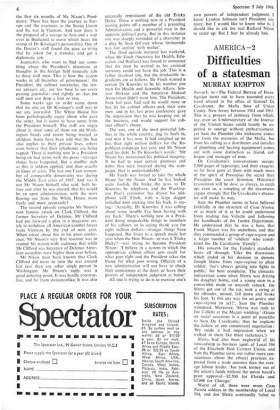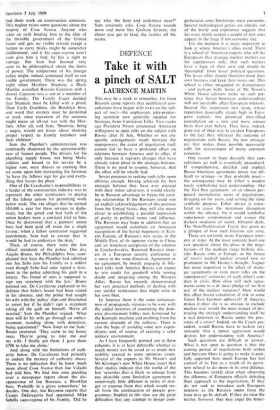AMERICA-2
Difficulties of a statesman
MURRAY KEMPTON
Newark, ru—The Federal Bureau of Inves- tigation turns out to have recorded every word uttered in the office of Samuel De Cavalcante, the Mafia boss of Union Couny, New Jersey between 1961 and 1965. This is a process of intimacy from which, say, even an Undersecretary of the Interior of the United States could hardly be ex- pected to emerge without embarrassment; yet Sam the Plumber (the nickname comes not from the mysteries of the Mafia, but from his calling as a distributor and installer of plumbing and heating equipment) comes out with some distinction as friend, col- league and manager of men.
De Cavalcante's conversations occupy 2,000 pages of typescript; and their exegetes so far have gone at them with much more of the spirit of Procopius the secret than Procopius the court historian. Historical revisionism will be slow, as always, to catch up; even so, a sampling of the documents argues strongly that De Cavalcante's'charac- ter will make its way.
Sam the Plumber seems to have believed faithfully in the structure of Cosa Nostra, or as much of it as he could understand from reading Joe Valachi and following the handbooks of the Justice Department. He understood that he was a boss, that Frank Majuri was his underboss, and that they commanded a group of capi-regime and a larger number of 'soldiers' who consti- tuted the De Cavalcante 'Family'.
His concern for the Family's standards beats all through. Take the discussions which ended in his decision to demote Joseph Sferra from capo-regima to plain soldier. `Joe's always getting into fights in public,' his boss complains. The climactic indiscretion came when Sferra was driving his daughter home, and a young man in a convertible made an uncouth remark. Joe Sferra got out of the car, took a swing at the offender, missed, fell down and broke his foot. Is this any way for an amico and capo-regima to act?', Sam the Plumber wondered. Moreover, Sferra was rude to Joe Colletti at the Majuri wedding.' (Grace on social occasions is a point of punctilio to Sam De Cavalcante; thus he explains the failure of one commercial negotiation: `We made a bad impression when we walked in there like three racketeers.') Sferra had also been neglectful of his stewardship as business agent of Local 394 of the Elizabeth Hod Carriers Union, and Sam the Plumber turns out rather more con- scientious about the ethical practices ex- pected from a trade unionist than the aver- age labour leader. `Joe took money out .of the union's funds without the union board's prior approval—$2,500 for Florida and $2,000 for Chicago.'
Worst of all, there were seven Cosa Nostra soldiers in the membership of Local 394, and Joe Sferra continually failed to find them work on construction contracts. This neglect raises some questions about the majesty of Cosa Nostra. Anyone who takes an oath binding him to the elite of the invisible government of the United States and gets no visible reward except a licence to carry bricks might be somewhat disillusioned; and if his capo-reginia won't even give him a hod, he has a right to outrage. But Sam had learned very soon to be philosophical about the limits of power. The temperance of his foreign policy might, indeed, commend itself to our visible government. There was the spring night when Matthew Shumate, a Black Muslim, assaulted Rosario Cucciaro with a shovel. Cucciaro was a son of a member of the Family; The Family Court decided that Shumate must be killed with a pistol. Then Carlo Gambino, the Brooklyn boss, sent word that matters must be permitted to cool, since execution of the sentence might mean an all-out war with the Mus- lims. After all, said Sam, 'Shumate, being a negro, would not know about showing proper respect to Family members and their children.'
Sam the Plumber's administration was continually shadowed by the untrustworthi- ness of honest people. The drivers for his plumbing supply house, not being Mafia soldiers and bound to his service by a higher vow, were thieves so cunning that we come upon him instructing the foreman `to have the fellows sign for gas and every- thing that leaves the place.'
One of De Cavalcante's responsibilities as a leader of the construction industry was to represent the other contractors in paying off the labour unions for permitting work below scale. The Fat alleges that he earned $50,000 a year for these services to diplo- macy, but the greed and bad faith of the union leaders were a constant trial to hint Once he discovered that a painters' union boss had been paid off twice for a single favour; when a fellow contractor suggested punishment, Sam had to answer that 'it would be bad to embarrass the man.'
Then, of course, there were the low ethical standards of the police. One day Angelo Bruno, the Philadelphia boss, com- plained that Sam the Plumber had admitted one Joe Sabo into his Family as a soldier even though Sabo had once signed a state- ment to the police admitting his guilt in a lottery. `No friend of ours is supposed to sign any statement with the law,' Bruno pointed out. De Cavalcante explained in his defence that Sabo's house had been raided in his absence, and the police had caught his wife with the 'policy' slips and threatened to arrest her if he didn't sign a statement taking all the guilt on himself. 'We're all married,' Sam the Plumber argued. 'What man will let his wife go through an embar- rassment, standing alone with detectives, being questioned?' Now listen to me Sam,' Bruno answered. 'They came to my house once. They're going to take me and my wife. I finally got them. 1 gave them $700 to take me alone.'
And along with the limitations of auth- ority below, De Cavalcante had patiently to endure the mystery of authority above. There is no indication that he knew much more about Cosa Nostra than Joe Valachi had told him. We find him once puzzling over a newspaper report about the dis- appearance of Joe Bananas, a Brooklyn boss. 'Probably in a grave somewhere.' he decides. One day, Joe Bayonne reports that Casper DeGregorio had appointed Mike Sebella capo-regima .of his Family. Did he say who the boss and underboss were?' Sam anxiously asks. Cosa Nostra sounds more and more like Graham Greene; the closer you get to God, the farther off He seems.



































 Previous page
Previous page